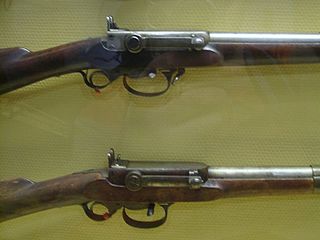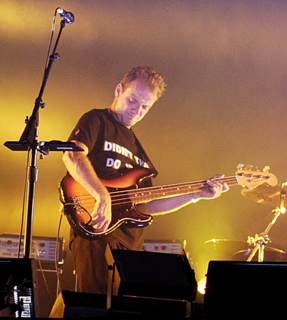Black metal is an extreme subgenre of heavy metal music. Common traits include fast tempos, a shrieking vocal style, heavily distorted guitars played with tremolo picking, raw (lo-fi) recording, unconventional song structures, and an emphasis on atmosphere. Artists often appear in corpse paint and adopt pseudonyms.

The Battle of Stamford Bridge took place at the village of Stamford Bridge, East Riding of Yorkshire, in England on 25 September 1066, between an English army under King Harold Godwinson and an invading Norwegian force led by King Harald Hardrada and the English king's brother Tostig Godwinson. After a bloody battle, both Hardrada and Tostig along with most of the Norwegians were killed. Although Harold Godwinson repelled the Norwegian invaders, his army was defeated by the Normans at Hastings less than three weeks later. The battle has traditionally been presented as symbolising the end of the Viking Age, although major Scandinavian campaigns in Britain and Ireland occurred in the following decades, such as those of King Sweyn Estrithson of Denmark in 1069–1070 and King Magnus Barefoot of Norway in 1098 and 1102–1103.

A-ha is a Norwegian band formed in Oslo in 1982. Founded by Morten Harket, Magne Furuholmen and Paul Waaktaar-Savoy (guitars), the band rose to fame during the mid-1980s and continued its global success in the 1990s and the 21st century.
Major is a military rank of commissioned officer status, with corresponding ranks existing in many military forces throughout the world.

A military band is a group of personnel that performs musical duties for military functions, usually for the armed forces. A typical military band consists mostly of wind and percussion instruments. The conductor of a band commonly bears the title of Bandmaster or Director of Music. Ottoman military bands are thought to be the oldest variety of military marching bands in the world, dating from the 13th century.

A state visit is a formal visit by a head of state to a foreign country, at the invitation of the head of state of that foreign country, with the latter also acting as the official host for the duration of the state visit. Speaking for the host, it is generally called a state reception. State visits are considered to be the highest expression of friendly bilateral relations between two sovereign states, and are in general characterised by an emphasis on official public ceremonies.
The Vikings were seafaring Scandinavians engaged in exploring, raiding and trading in waters and lands outside of Scandinavia from the eighth to eleventh centuries.
Ensign is a junior rank of a commissioned officer in the armed forces of some countries, normally in the infantry or navy. As the junior officer in an infantry regiment was traditionally the carrier of the ensign flag, the rank acquired the name. This rank has generally been replaced in army ranks by second lieutenant. Ensigns were generally the lowest ranking commissioned officer, except where the rank of subaltern existed. In contrast, the Arab rank of ensign, لواء, liwa', derives from the command of units with an ensign, not the carrier of such a unit's ensign, and is today the equivalent of a major general.

The Norwegian Armed Forces is the military organisation responsible for the defence of Norway. It consists of four branches, the Norwegian Army, the Royal Norwegian Navy, which includes the Coast Guard, the Royal Norwegian Air Force, and the Home Guard, as well as several joint departments.
The early 1990s Norwegian black metal scene is credited with creating the modern black metal genre and produced some of the most acclaimed and influential artists in extreme metal. It attracted massive media attention when it was revealed that its members had been responsible for two murders, one suicide, and a wave of church burnings in Norway.

The German occupation of Norway during World War II began on 9 April 1940 after German forces invaded the neutral Scandinavian country of Norway. Conventional armed resistance to the German invasion ended on 10 June 1940 and the Germans controlled Norway until the capitulation of German forces in Europe on 8/9 May 1945. Throughout this period, Norway was continuously occupied by the Wehrmacht. Civil rule was effectively assumed by the Reichskommissariat Norwegen, which acted in collaboration with a pro-German puppet government, the Quisling regime, while the Norwegian King Haakon VII and the prewar government escaped to London, where they acted as a government in exile. This period of military occupation is in Norway referred to as the "war years" or "occupation period".

The Kammerlader, or "chamber loader", was the first Norwegian breech-loading rifle, and among the very first breech loaders adopted for use by an armed force anywhere in the world. A single-shot black-powder rifle, the kammerlader was operated with a crank mounted on the side of the receiver. This made it much quicker and easier to load than the weapons previously used. Kammerladers quickly gained a reputation for being fast and accurate rifles, and would have been a deadly weapon against massed ranks of infantry.

The Swedish–Norwegian War, also known as the Campaign against Norway, War with Sweden 1814, or the Norwegian War of Independence, was a war fought between Sweden and Norway in the summer of 1814. The war resulted in a Swedish victory which lead to Norway being forced to enter into union with Sweden, but with its own constitution and parliament under the rule of the Swedish monarch Charles XIV.
Guðmundr was a semi-legendary Norse king in Jotunheim, ruling over a land called Glæsisvellir, which was known as the warrior's paradise.

"In the Army Now" is a song by the South African-born Dutch duo Bolland & Bolland, released in 1982. The song spent 6 consecutive weeks on the top of the Norwegian singles chart. The song was also later recorded by the British rock band Status Quo on their 1986 album, In the Army Now, and their version peaked at number 2 in the UK Singles Chart.
The 1994 Winter Olympics closing ceremony was held in Lysgårdsbakken in Lillehammer, Norway on 27 February 1994. All spectators were handed a flashlight with the inscription "Remember Sarajevo" – the host of the 1984 Winter Olympics which was at the heart of the Bosnian War. The first entrants on the stage were Liv Ullmann and Thor Heyerdal, followed by the athletes' precession. After the flag had been transferred to Nagano mayor Tasuka Tsukada, speeches were held by Lillehammer mayor Audun Tron, LOOC head Gerhard Heiberg and IOC president Juan Antonio Samaranch. The latter used his speech to commemorate Sarajevo's situation, before giving Heiberg the IOC's gold medal, and declaring the games "the best Olympic Winter Games ever". Artistic presentations followed, revisiting many of the themes from the opening ceremony. The mascots of the 1998 Winter Olympics, the "Snowlets", were also presented. Of the 2,200 people performing in the opening and closing ceremonies, only 50 were professionals.

The Battle of Strömstad took place on July 19, 1717 at Strömstad during the Great Northern War. The Swedish army of about 1,800 men under the command of Johan Giertta defeated the Danish fleet of several larger vessels and perhaps 4,000 men under Peder Tordenskjold. Peter tried to destroy the stocks of supplies Sweden had gathered for the upcoming invasion of Norway. In the battle about 200 Swedes were either dead or wounded and about 350 Norwegians.












